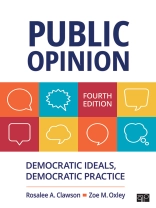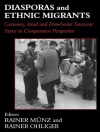In
Public Opinion: Democratic Ideals, Democratic Practice, Fourth Edition, Clawson and Oxley link the enduring normative questions of democratic theory to existing empirical research on public opinion. Organized around a series of questions—In a democratic society, what should be the relationship between citizens and their government? Are citizens’ opinions pliable? Are they knowledgeable, attentive, and informed?—the text explores the tension between ideals and their practice. Each chapter focuses on exemplary studies, explaining not only the conclusion of the research, but how it was conducted, so students gain a richer understanding of the research process and see methods applied in context.
Jadual kandungan
Tables, Figures, and Features
Preface
Acknowledgments
Part I. What Should the Role of Citizens Be in a Democratic Society?
Chapter 1. Public Opinion in a Democracy
Theories of Democracy
What Is Public Opinion?
Defining Key Concepts
Empirical Assessments of Public Opinion
Themes of the Book
Appendix to Chapter 1 Studying Public Opinion Empirically
Public Opinion Surveys
Experiments
Interviews
Focus Groups
Content Analysis
Conclusion
Part II. Are Citizens Pliable?
Chapter 2. Political Socialization
Childhood Socialization
Parental Transmission of Political Attitudes
Generational and Period Effects
Genetic Inheritance of Political Attitudes
Conclusion
Chapter 3. Mass Media
What Should Citizens Expect from the Mass Media in a Democracy?
What General Characteristics of the Mass Media Shape News Coverage?
What Specific Characteristics of the Traditional News Media Shape the Reporting of Political Events?
What About Fake News?
Are Citizens Affected by the Mass Media?
Media Effects in a Changing Technological Environment
Conclusion
Chapter 4. Attitude Stability and Attitude Change
Are Americans’ Attitudes Stable?
Presidential Approval
Psychological Approaches to Attitudes
Conclusion
Part III. Do Citizens Organize Their Political Thinking?
Chapter 5. Ideology, Partisanship, and Polarization
Converse’s Claim: Ideological Innocence
Ideological Identification
Party Identification
Polarization
Conclusion
Chapter 6. Roots of Public Opinion: Personality, Self-Interest, Values, and History
Personality
Self-Interest
Values
Historical Events
Conclusion
Chapter 7. Roots of Public Opinion: The Central Role of Groups
Race, Ethnicity, and Public Opinion
Rural Consciousness
Gender and Public Opinion
Conclusion
Part IV. Do Citizens Endorse and Demonstrate Democratic Basics?
Chapter 8. Knowledge, Interest, and Attention to Politics
How Knowledgeable, Interested, and Attentive Should Citizens Be in a Democracy?
Are Citizens Knowledgeable about Politics?
Measuring Political Knowledge
Why Are Some Citizens More Knowledgeable Than Others?
What Are the Consequences of Political Knowledge?
Are Citizens Interested in and Attentive to Politics?
Conclusion
Chapter 9. Support for Civil Liberties
Support for Democratic Principles
Are Americans Tolerant?
Sources of Tolerant Attitudes
Contextual Influences on Tolerance Judgments
Are Elites More Tolerant?
Civil Liberties Post-9/11
Conclusion
Chapter 10. Support for Civil Rights
Public Opinion and Presidential Candidates
Support for Civil Rights Policies
Conclusion
Part V. What Is the Relationship between Citizens and Their Government?
Chapter 11. Trust in Government, Support for Institutions, and Social Capital
Trust in Government
Support for Institutions
Social Capital
Conclusion
Chapter 12. Impact of Public Opinion on Policy
Should Public Opinion Influence Policy?
Is Public Opinion Related to Policy?
Do Politicians Follow or Lead the Public?
Public Opinion and Foreign Policy
Conclusion
Part VI. What Do We Make of Public Opinion in a Democracy?
Chapter 13. Conclusion
What Should the Role of Citizens Be in a Democratic Society?
Are Citizens Pliable?
Do Citizens Organize Their Political Thinking?
Do Citizens Endorse and Demonstrate Democratic Basics?
What Is the Relationship between Citizens and Their Government?
What Do We Make of Public Opinion in a Democracy?
Notes
Glossary
Index
About the Authors
Mengenai Pengarang
Zoe M. Oxley is professor of political science at Union College. Her research interests include the effects of the media on public opinion, gender and public opinion, women in electoral politics, and political psychology. Her work has been published in the American Political Science Review, Journal of Politics, Political Research Quarterly, Politics & Gender, and PS: Political Science and Politics.












